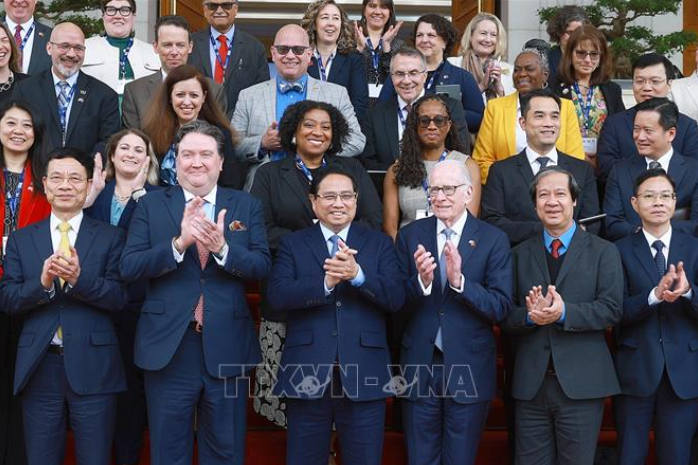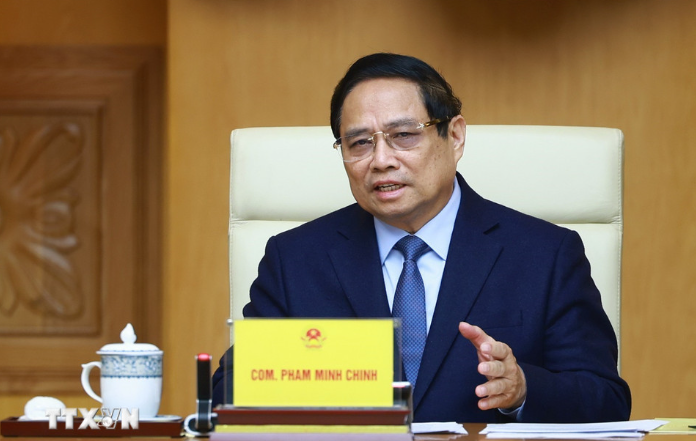Vietnam-US universities urged to drive innovation through strategic partnerships
THE HANOI TIMES — Vietnam is calling for its most ambitious wave of educational collaboration with the United States to date, as Prime Minister Pham Minh Chinh urged top US and Vietnamese universities to launch long-term, high-impact academic partnerships aligned with national goals in high-tech industries, digital transformation, and global competitiveness.
Speaking at a high-level meeting in Hanoi on March 31 with leaders from 21 leading US universities participating in the 2025 International Academic Partnership Program (IAPP), the Prime Minister stressed the urgent need for cooperation that produces results, not just memorandums.

Prime Minister Pham Minh Chinh meets with leaders of US universities visiting Vietnam for the International Academic Partnership Program (IAPP). Photo: Duong Giang/TTXVN
“Projects must be specific, practical, long-lasting and effective," he said, outlining key priorities such as AI, semiconductors, green energy, biotechnology, and marine and space technologies.
The meeting brought together 30 Vietnamese universities, key Cabinet members, and US Ambassador to Vietnam Marc E. Knapper in a show of academic diplomacy as the two nations celebrate 30 years of diplomatic relations. With over 30,000 Vietnamese students currently studying in the US, placing Vietnam fifth among all foreign student populations, PM Chinh said it's time to move beyond student flows and build strategic alliances that shape human capital and innovation capacity at home.

Prime Minister Pham Minh Chinh speaks during a meeting with leaders of US universities visiting Vietnam for the International Academic Partnership Program (IAPP). Photo: Duong Giang/TTXVN
He pointed to the recent surge in US corporate interest in Vietnam from giants such as Intel, NVIDIA, and Apple as a clear signal that educational institutions must prepare a future-ready workforce. “Universities must work closely with enterprises to align training with market demands,” he said, adding that Vietnamese institutions are seeking expanded access to scholarships, dual-degree programs, and joint research initiatives with American counterparts.
PM Chinh also called on US universities to be advocates for policy shifts in Washington, including the recognition of Vietnam’s market economy status and the removal of restrictions on high-tech exports. “Such changes, would allow education and innovation partnerships to unlock their full potential and contribute meaningfully to Vietnam’s socioeconomic development.”
The IAPP 2025 event served as a platform to discuss collaborative opportunities in STEM, ICT, digital transformation, green transition, public health, law, agriculture, and Vietnamese language studies. University leaders from both countries proposed a range of actions, including faculty and student exchanges, curriculum co-development, and joint innovation hubs.
Ambassador Knapper and US academic representatives affirmed their readiness to support Vietnam’s education strategy and praised the country’s focus on quality, access and innovation. “We’re not here just to visit, we’re here to build,” one university leader noted during the dialogue.
Vietnam currently allocates up to 20% of its total state budget to education and training, part of its broader strategy to accelerate science, technology and digital transformation. With a national GDP growth target of 8% in 2025, the Prime Minister reiterated that a skilled, innovative workforce is a cornerstone of Vietnam’s path toward becoming a high-income country.
“Education and training are national priorities,” he said. “We value intelligence, time and decisiveness and we must turn good intentions into great outcomes.”









